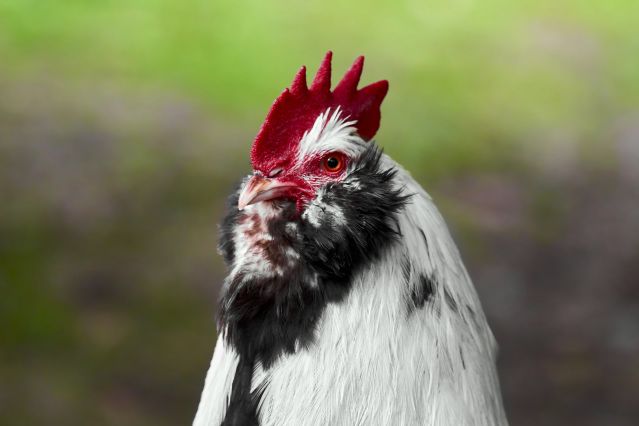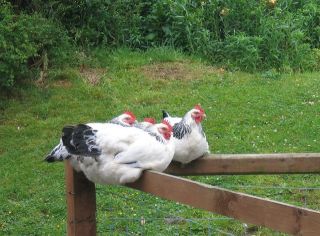Animal Behavior
Backyard Chickens: Poultry, Pets, or Something In Between?
A survey reveals chicken owners’ positive feelings toward their birds.
Posted January 30, 2024 Reviewed by Abigail Fagan
Key points
- Researchers surveyed 2,000 chicken owners on care-taking practices and attitudes towards chickens.
- Results indicate positive attitudes towards chickens and personal relationships between owners and chickens.
- Most chicken owners still consumed chicken meat and eggs, and many kept chickens in order to eat their eggs.

Chickens are experiencing a surge in popularity. In the U.S. alone, there are an estimated 85 million backyard or household chickens, making them the third most common pet in the country. Yet, there is a dearth of research into chicken care practices and chicken owners’ attitudes towards their birds.
Jenny Mace, of the University of Winchester, was inspired by her own experience of caring for ex-commercial chickens (former commercial laying hens who are rehomed rather than slaughtered). When she searched the scientific literature for evidence-based answers regarding chicken care and welfare, she was left with little definitive guidance.
To learn more, Mace and colleague Andrew Knight designed an online survey for chicken owners, which was promoted on various chicken-oriented Facebook groups and by other chicken-centric organizations.
Among the over 2,000 respondents, the survey found variable care-taking practices. But overall, attitudes towards chickens were positive and owners reported “personal” (though not “close personal”) relationships with their chickens.
Mace says some of the patterns of responses indicate that chickens’ status is on the rise, becoming more akin to that of pets than livestock.
“I didn’t specifically ask, do you think of your chicken as a pet,” says Mace. “But there were other statements that are very suggestive of that. For example, over 90% would never kill their chickens for consumption, and over 75% did not see their chickens as morally less important than dogs. And nearly 70% disagreed with breeding chickens for maximum egg production.”

Other indications of chickens’ changing status were the responses to questions regarding keeping chickens indoors and caring for disabled chickens. Nearly 20% of respondents had cared for a chicken with special needs (examples ran the gamut and included deaf or blind birds, birds that required a wheelchair, and birds that required special feeding or medications). A similar percentage of respondents regularly let their chickens into their home, many for long periods.
These answers potentially show that household chickens are making the journey from the backyard, where they function as workers, to living rooms and even beds, where they act as companion animals—but it’s complicated.
Chickens on the Rise
Mace and Knight also inquired about the diets of chicken owners. While there were greater proportions of vegetarians and vegans among chicken owners than the general population, the vast majority of chicken owners followed an omnivorous diet that included chicken meat and/or eggs.
“For a lot of people, there seems to be a difference between their own chickens on their doorstep versus those distant chickens that they don’t know,” says Mace.

Additionally, about half of respondents reported provision of eggs as a key motivation for keeping chickens. Domesticated chickens have been bred to produce many more eggs than their ancestors (300-plus eggs per year, rather than around 12). Mace and others are concerned that all this egg-laying may have negative effects on chickens’ health and welfare.
There is a hormonal implant that can be used to prevent egg laying. However, 68% of respondents had not heard of it. What’s more, the use of these implants in pet chickens is not permitted in all countries, including the U.S. More research is needed to determine if hormonal implants are good for chicken welfare. But if they are found to benefit hen health at the expense of egg production, what will owners choose?
Overall, the results of the survey may suggest that chickens may fall somewhere between the dichotomies of pet and livestock; they are a little bit of both.
“Even though chickens’ status is increasing amongst carers, maybe it will never quite reach that of cats and dogs,” says Mace. “Maybe chickens will always be, as other authors have suggested, pets with benefits.”
Although the survey revealed where gaps in knowledge still exist, Mace is encouraged by the genuine affection so many people appear to have for their chickens.
“Society needs to catch up to the emerging higher status of chickens,” she says. For instance, there is a need for more locally available and affordable veterinary care for chickens, more research into hormonal implants, and more resources devoted to rooster welfare.
“There is a lot of love for people’s chickens out there,” says Mace. “It’s about harnessing those good intentions and providing the infrastructure to support that love and affection.”
References
Mace JL, Knight A. From the Backyard to Our Beds: The Spectrum of Care, Attitudes, Relationship Types, and Welfare in Non-Commercial Chicken Care. Animals. 2024; 14(2):288. Doi: 10.3390/ani14020288.




